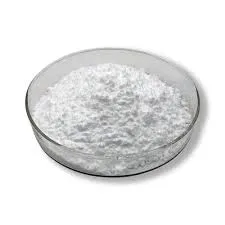
Dec . 01, 2024 11:45 Back to list
hydroxypropyl methyl cellulose in supplements
The Role of Hydroxypropyl Methylcellulose in Dietary Supplements
In the world of dietary supplements, consumers are always on the lookout for products that are effective, safe, and offer the desired health benefits. One ingredient that has gained attention in recent years is Hydroxypropyl Methylcellulose (HPMC). This versatile compound, primarily used as a thickening agent, emulsifier, and film-forming agent, has found its way into various supplements, contributing to their efficacy, bioavailability, and stability.
What is Hydroxypropyl Methylcellulose?
Hydroxypropyl Methylcellulose is a semi-synthetic polymer derived from cellulose, a natural polysaccharide found in the cell walls of plants. The cellulose is chemically modified to produce HPMC, which offers improved solubility and properties that make it suitable for a wide range of applications. HPMC is non-toxic, gluten-free, and generally recognized as safe (GRAS) by the Food and Drug Administration (FDA), making it an attractive option for both manufacturers and consumers.
Uses in Dietary Supplements
HPMC is primarily used in dietary supplements for several reasons
1. Binding Agent HPMC acts as a binding agent in tablet formulations, helping to hold the ingredients together and maintain the tablet's structural integrity. This is particularly important for creating supplements that are easy to swallow and dissolvable in the gastrointestinal tract.
2. Thickening and Stabilizing Agent In liquid supplements, HPMC serves as a thickener, providing a consistent texture and preventing the separation of ingredients. This stabilizing property ensures that active compounds remain evenly distributed, enhancing the supplement’s effectiveness.
3. Film-Coating HPMC is also used as a coating agent for tablets and capsules. The film coating can provide a barrier that protects the ingredients from moisture and light, which may degrade sensitive compounds. Additionally, this coating can make supplements easier to swallow, improving the user experience.
hydroxypropyl methyl cellulose in supplements

4. Controlled Release Mechanism One of the most significant advantages of HPMC is its ability to control the release of active ingredients. This property is especially beneficial for supplements designed for sustained-release formulations, allowing for a gradual release of nutrients over time. This controlled delivery can enhance the bioavailability of certain nutrients, ensuring that the body receives them more effectively.
5. Vegan and Vegetarian-Friendly HPMC is plant-derived, making it a suitable choice for vegan and vegetarian supplements. As more consumers seek plant-based options, the inclusion of HPMC can help manufacturers meet the demand for supplements free from animal products.
Potential Health Benefits
While HPMC itself is primarily regarded as an inert ingredient, it indirectly contributes to the overall effectiveness of dietary supplements by enhancing their formulation. By improving the stability, absorption, and bioavailability of active ingredients, HPMC can help ensure that consumers receive the full benefits of the nutrients they are taking.
For example, in dietary supplements containing vitamins, minerals, or herbal extracts, HPMC helps maintain the potency of these compounds through its stabilizing properties. This is vital as many active ingredients can be sensitive to environmental factors such as humidity and temperature.
Considerations and Safety
While HPMC is generally considered safe for consumption, it is important for consumers to be aware of the dosages of their chosen supplements. As with any additive, excessive consumption may lead to gastrointestinal issues such as bloating or diarrhea. Therefore, it is advisable to follow the recommended dosage instructions provided by the manufacturer.
Conclusion
Hydroxypropyl Methylcellulose is a multifunctional ingredient that plays a crucial role in the formulation of dietary supplements. Its ability to serve as a binding, thickening, and film-forming agent, combined with its safety and compatibility with various dietary needs, makes it an ideal choice for supplement manufacturers. As consumers continue to seek effective and reliable health products, HPMC will likely remain an important component of the dietary supplement landscape, contributing to the formulation of high-quality, effective health solutions.
-
Versatile Hpmc Uses in Different Industries
NewsJun.19,2025
-
Redispersible Powder's Role in Enhancing Durability of Construction Products
NewsJun.19,2025
-
Hydroxyethyl Cellulose Applications Driving Green Industrial Processes
NewsJun.19,2025
-
Exploring Different Redispersible Polymer Powder
NewsJun.19,2025
-
Choosing the Right Mortar Bonding Agent
NewsJun.19,2025
-
Applications and Significance of China Hpmc in Modern Industries
NewsJun.19,2025







